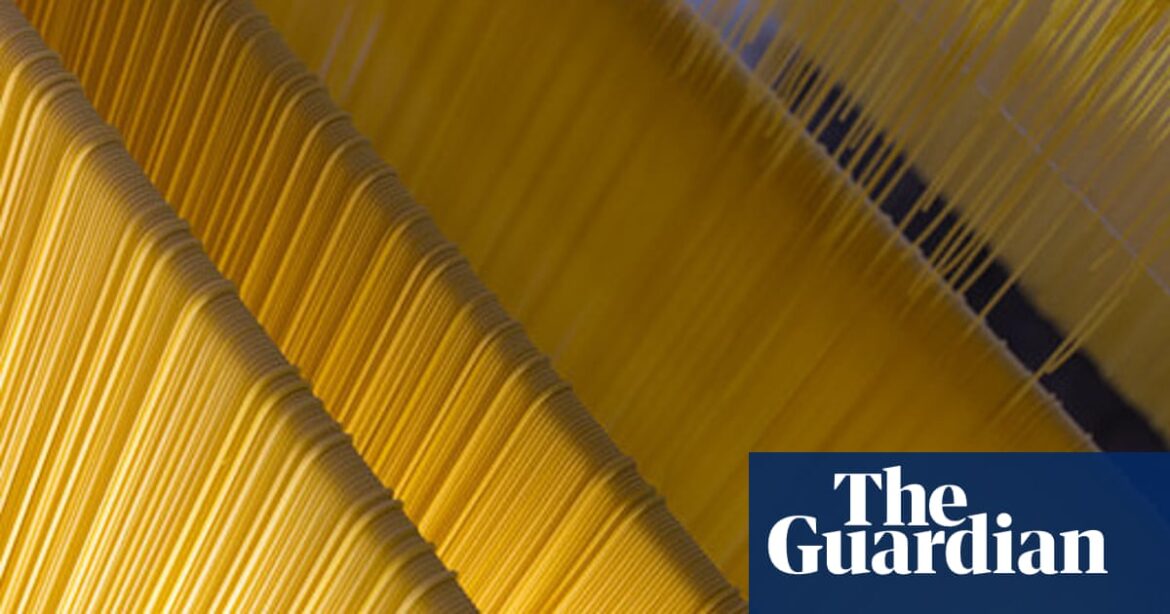“It’s a real pity,” laments Antonio Rummo of Donald Trump’s latest target in his ever-evolving tariff war: Italian pasta. Rummo is the sixth-generation grandson of the founder of Pasta Rummo, who opened a wheat mill in Benevento in southern Italy in 1846, using the family’s three horses to lug grain from the surrounding Campania region and Puglia to produce fresh pasta.
“Demand for premium pasta in the US has been growing,” says Rummo. Appreciated by consumers for a traditional processing method that guarantees it will cook to al dente perfection, sales of Pasta Rummo have been thriving.
“Our brand has grown especially fast over the last six years, something that took us by surprise, but which were are very proud of,” he said, but he fears the US president’s tariffs could put paid to that.
Italian food producers had thought the worst was behind them when Trump agreed in August to reduce tariffs on imports of EU goods to a flat rate of 15%, and had been hoping his friendly relations with the Italian prime minister, Giorgia Meloni, would protect them from any further turbulence.
Antonio Rummo. Photograph: Ilaria Corticelli/Rummo SpA
Not so. The world of pasta, a staple of Italy’s culinary heritage, has been thrown into disarray after Washington threatened to whack an another 92% on some of the country’s oldest pasta manufacturers in what the Italian media has declared “Trump’s war against pasta”.
Rummo says Pasta Rummo sells for about $4 (£3) a packet, but the price could double if the additional tariffs are applied.
The extra duties, poised to take effect in January, are the result of an investigation by the US Department of Commerce into dumping practices, whereby foreign firms export goods at prices lower than in the domestic market to gain advantage over local competitors.
The investigation, pushed by US rivals, specifically targeted the manufacturers La Molisana and Garofalo, given their volume of US sales, but by dint of association has left 11 other top Italian pasta brands, including the family-run Barilla and Pasta Rummo, in the firing line.
Italy’s pasta exports were worth more than €4bn (£3.5bn) in 2024, with the US among the top three destinations.
The punitive outcome is proving difficult for Italian pasta makers, which are all preparing to take legal action, to digest. Giuseppe Ferro, the chief executive of La Molisana, which has been making pasta since 1912, told the Italian press the dumping accusations were unfounded and that he hoped Trump’s government would change its mind because otherwise “it would be impossible for us to work”.
The tariffs are thought to be intended to encourage Italian producers to set up factories in the US, a strategy that appears to have led to investments in other industries such as pharmaceuticals.
La Molisana denied rumours that it would relent, while Emidio Mansi, the marketing director for Garofalo, said the company had no intention of opening factories in the US. “We have been in Gragnano [a town near Naples] since 1789 and are not moving,” he told Gambero Rosso.
skip past newsletter promotion
Sign up to Business Today
Get set for the working day – we’ll point you to all the business news and analysis you need every morning
Privacy Notice: Newsletters may contain information about charities, online ads, and content funded by outside parties. If you do not have an account, we will create a guest account for you on theguardian.com to send you this newsletter. You can complete full registration at any time. For more information about how we use your data see our Privacy Policy. We use Google reCaptcha to protect our website and the Google Privacy Policy and Terms of Service apply.
after newsletter promotion
Meloni’s government and the European Commission are lobbying Washington to backtrack. Italy’s agriculture minister, Francesco Lollobrigida, said the targeting of pasta was “hyper-protectionist”. “We see neither the need nor the justification,” he said.
Ettore Prandini, the president of Coldiretti, Italy’s biggest agribusiness association, said the tariffs would be a “fatal blow” for Italian pasta.
“It is very harmful and nobody imagined that a situation like this could arise, especially after Europe had reached the agreement on 15%,” he said.
Prandini said the tariffs were especially brutal given that the US is rife with products that mimic the names of well-known Italian food brands.
“This is a real challenge in America,” he said, adding that the country is the biggest culprit when it comes to producing “Italian sounding” brands. “The market in imitation Italian products is worth about €120bn globally, of which €40bn is produced in the US, “ he said. “This impacts the entire Italian food industry.”


Dining and Cooking